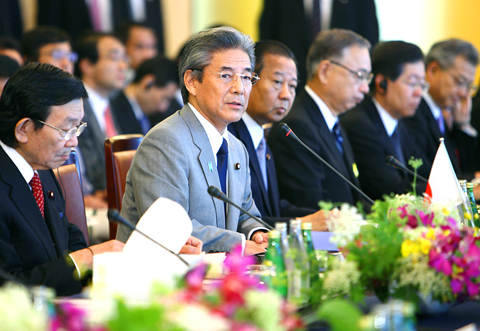Top ministers from Japan and China began a day-long meeting yesterday to discuss the global financial crisis and ways to boost trade ties between the world’s No. 2 and No. 3 economies.
The Japan-China High-Level Economic Dialogue in Tokyo drew an 80-strong Beijing delegation led by Vice Premier Wang Qishan (王岐山).
Measures to cope with the global economic crisis, trade and investment ties between the two Asian economic giants and cooperation on environmental and energy issues were to top the agenda, officials said.

PHOTO: BLOOMBERG
“We hope that both countries will cooperate hand-in-hand for financial stability and economic growth in Asia and the world,” Wang said yesterday at the opening of the meeting with host officials led by Japanese Foreign Minister Hirofumi Nakasone.
On the sidelines, ministers were holding a series of bilateral meetings, including how to deal with North Korea in light of the secretive regime’s recent nuclear test and test-firing of missiles.
China, one of the UN Security Council’s five veto-wielding permanent members and a Pyongyang ally, has in the past blunted calls led by Washington and Tokyo for strong punishment of the isolated regime over its nuclear program.
Chinese Commerce Minister Chen Deming (陳德銘) and Japanese Minister of Economy, Trade and Industry, Toshihiro Nikai, agreed on the launch of annual official talks on jointly cracking down on copyright and trademark piracy.
“It is very significant that we exchanged a memorandum of understanding today on intellectual property rights ... as this is an issue of international interest,” Nikai told reporters after a 50-minute meeting with Chen.
“This memorandum does not solve everything but we will set up a working group soon for detailed talks,” he said.
The first round of talks are expected later this year, a Japanese official said.
China is Japan’s top trade partner, but Japanese companies have often protested over factories in China that produce knock-offs of products ranging from DVDs and clothes to electronics.
Nikai also reiterated Tokyo’s call for China to scrap rules that require certification of information technology (IT) products to be used by the government in Beijing.
China said its inspectors had to examine and certify more than a dozen types of IT products, including anti-hacking software, before foreign firms could sell them to the government.
The US, Japan and other major IT manufacturers fear that China will use the process to learn trade secrets.
Separately, the governmental Japan Bank for International Cooperation and the Export-Import Bank of China are to agree to give financial support for development projects in poorer Asian countries, a Japanese official said.
It will be the first arrangement between Japan and China to jointly provide development assistance to third countries.

Auschwitz survivor Eva Schloss, the stepsister of teenage diarist Anne Frank and a tireless educator about the horrors of the Holocaust, has died. She was 96. The Anne Frank Trust UK, of which Schloss was honorary president, said she died on Saturday in London, where she lived. Britain’s King Charles III said he was “privileged and proud” to have known Schloss, who cofounded the charitable trust to help young people challenge prejudice. “The horrors that she endured as a young woman are impossible to comprehend and yet she devoted the rest of her life to overcoming hatred and prejudice, promoting kindness, courage, understanding

Tens of thousands of Filipino Catholics yesterday twirled white cloths and chanted “Viva, viva,” as a centuries-old statue of Jesus Christ was paraded through the streets of Manila in the nation’s biggest annual religious event. The day-long procession began before dawn, with barefoot volunteers pulling the heavy carriage through narrow streets where the devout waited in hopes of touching the icon, believed to hold miraculous powers. Thousands of police were deployed to manage crowds that officials believe could number in the millions by the time the statue reaches its home in central Manila’s Quiapo church around midnight. More than 800 people had sought

DENIAL: Pyongyang said a South Korean drone filmed unspecified areas in a North Korean border town, but Seoul said it did not operate drones on the dates it cited North Korea’s military accused South Korea of flying drones across the border between the nations this week, yesterday warning that the South would face consequences for its “unpardonable hysteria.” Seoul quickly denied the accusation, but the development is likely to further dim prospects for its efforts to restore ties with Pyongyang. North Korean forces used special electronic warfare assets on Sunday to bring down a South Korean drone flying over North Korea’s border town. The drone was equipped with two cameras that filmed unspecified areas, the General Staff of the North Korean People’s Army said in a statement. South Korea infiltrated another drone

Cambodia’s government on Wednesday said that it had arrested and extradited to China a tycoon who has been accused of running a huge online scam operation. The Cambodian Ministry of the Interior said that Prince Holding Group chairman Chen Zhi (陳志) and two other Chinese citizens were arrested and extradited on Tuesday at the request of Chinese authorities. Chen formerly had dual nationality, but his Cambodian citizenship was revoked last month, the ministry said. US prosecutors in October last year brought conspiracy charges against Chen, alleging that he had been the mastermind behind a multinational cyberfraud network, used his other businesses to launder